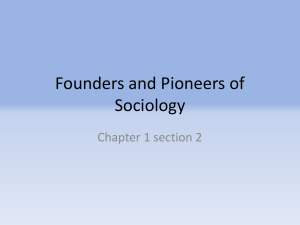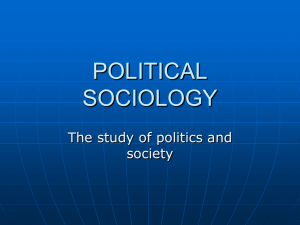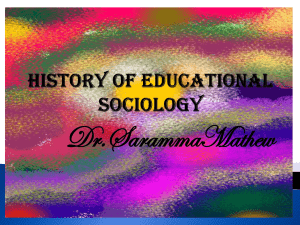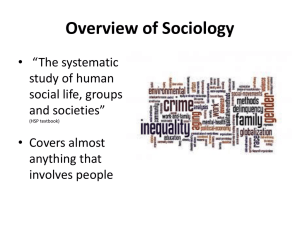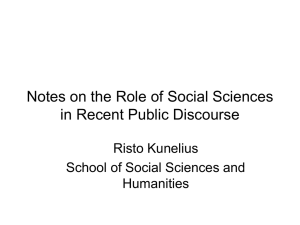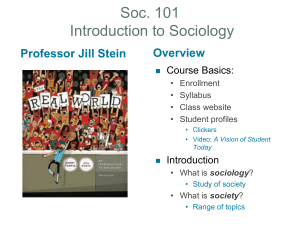A Global Perspective in Sociology
advertisement
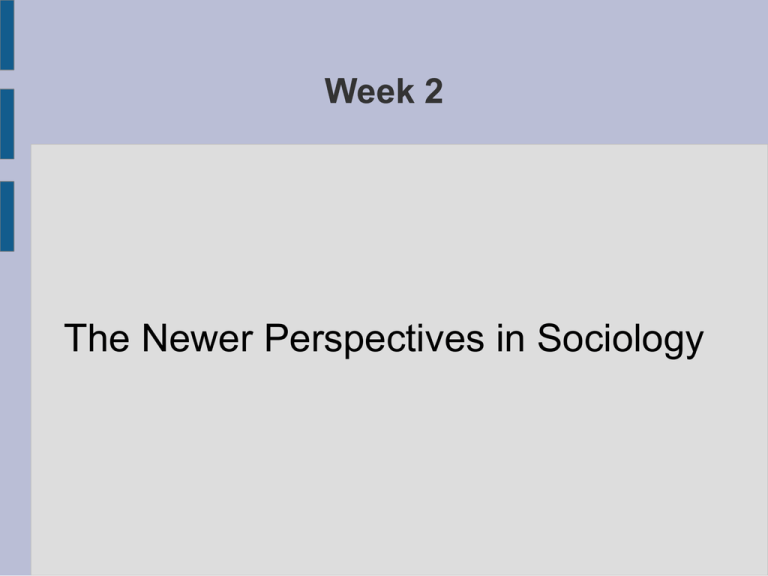
Week 2 The Newer Perspectives in Sociology Although functionalism, conflict theory and action perspective are still common positions within sociology, many others have emerged over the past two decades Sociology is often seen as containing a multiple perspective, which means it takes on many perspectives for looking at social life rather than just one Society is changing, so too are some of the approaches being adopted within it Broadly, the newer approaches highlight different perspectives, standpoints, cultures or voices Since we cannot grasp the 'full truth' of society, we should be more open about the newer perspectives we adopt This recognition of perspectives, points of view, different cultures and standpoints has become more and more important for contemporary sociology Many of the new perspectives suggest that the major perspective of the past has been that of white, Western, Anglo-American and heterosexual men In contrast, the newer perspectives generally see a range of other voices that have been missed out of sociology in the past They help to enrich the openness of the discipline to the range of ways of seeing society Some of these newer sociologies thus speak of 'the death of the meta-narrative' – a term coined by Lyotard - as a way of rejecting any idea that there is one and only one, 'Big story of sociology' These new voices include women, racial and ethnic minorities, colonised peoples throughout the world, gays and lesbians, the elderly, disabled people and various other marginalised or overlooked groups Taken together, a number of criticisms of classical sociology can be briefly summarised as follows a) that sociology has mainly been by men for men and about men – and for men, read white and heterosexual and usually privileged and relatively affluent b) that areas of significance to other groups -racism, patriarchy, homofobia, colonisation, disablement have often been overlooked c) often sociology has been sexist, racist, homophobic, etc The Case of a Feminist Sociology and a Feminist Methodology Broadly, these place either women or gender at the center of their specific analysis The main purpose is to reduce or eliminate women's subordination and oppression in societies across the world The perspectives differ: some highlight post-colonial perspectives, some focus on black studies Other newer sociological perspectives are: multiculturalism, post-colonialism, queer theory, Foucault's discourse theory, disablement theory, post-modern social theory As you see, sociology is a continuosly growing and changing discipline of study that is always bringing new challenges to its students Sociology, therefore, has had to rethink some of its key ideas to at least accommodate these changes 'It has all been done. The extreme limit of ... possibilities has been reached. It has destroyed itself. It has deconstructed its entire universe. So all that are left are pieces. All that remains to be done is play with the pieces. Playing with the pieces – that is postmodern' (Baudrillard, 1984: 24) In the 21th century, this modern world is an accelerating one where there is an increased sensitivity to diversities and differences 'Postmodernists argue for respecting the existence of a plurality of perspectives, as against a notion that there is one single truth from a privileged perspective; local, contextual studies in place of grand narratives; an emphasis on disorder, flux and openness, as opposed to order, continuity and restraint' (Rob Stones, 1996: 22) A Global Perspective in Sociology A global perspective is the study of the larger world and each society's place in it Thanks to global perspectives, we can now pay attention to voices heard in all parts of the world – from various African states to those found in Latin American countries Globalisation is the increasing interconnectedness of societies Globalisation can be grasped through the imagery of worldwide companies such as Coca Cola and Starbucks These companies produce goods across many countries; they market goods across many countries; and they present their logos and images which travel the global ahead of them So globalisation has a) shifted the borders of economic transactions b) expanded communications into global networks c) fostered a new, widespead 'global culture' d) developed new forms of international governance e) created a growing awareness of shared common world problems f) fostered a growing sense of risk – what the German sociologist Ulrich Beck (1992) has called the world risk society These risks are associated with the many new technologies which generate new dangers to life and the planet itself These are humanly produced, may have massive unforeseen consequences Risk, then, is associated with the globalising world The Lady is Dead by The Irrepressibles http://www.youtube.com/watch?v=l_2AgaZJWro

